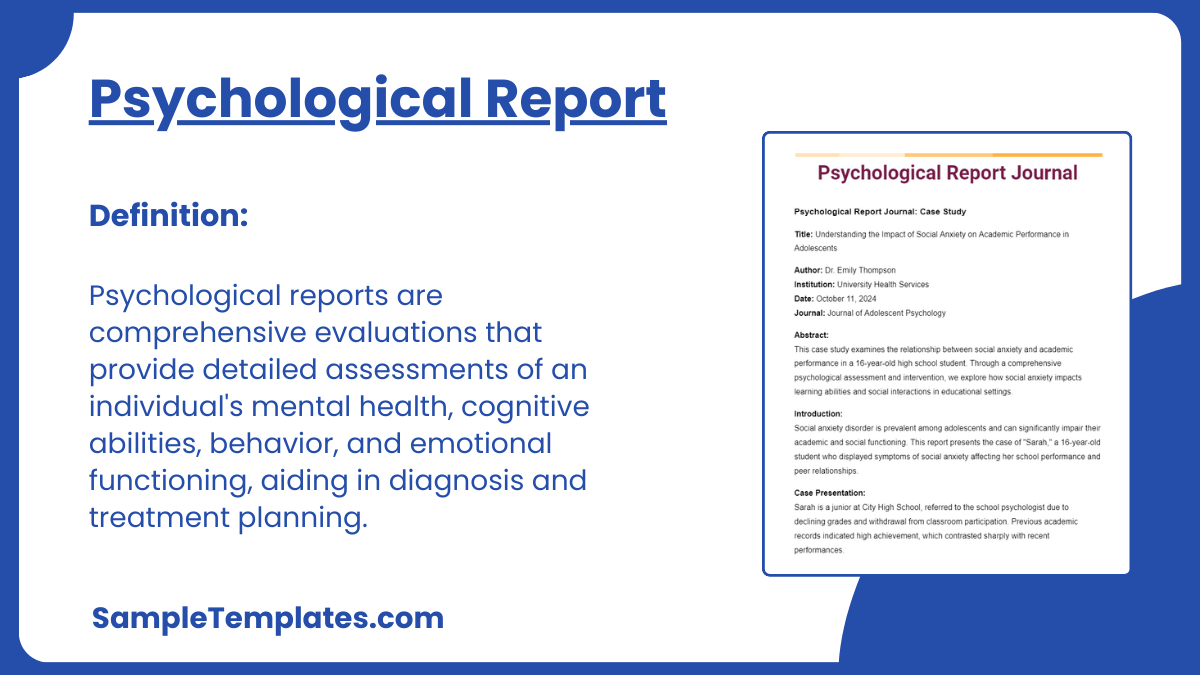A psychological report is a report prepared by a psychologist. It focuses a person’s behavior, personality, and capabilities. The report can only be interpreted by a qualified psychologist or an intern. Also, psychological assessment can only be done by a professional psychologist so as to make sure that the report is error free and reliable.
If the report or the evaluation is not done by either a licensed psychologist or a trainee (an intern), then it shouldn’t be used to make a decision on one’s health. On this post, we have reviewed samples of different types of psychological reports. You can also see more on sample reports.
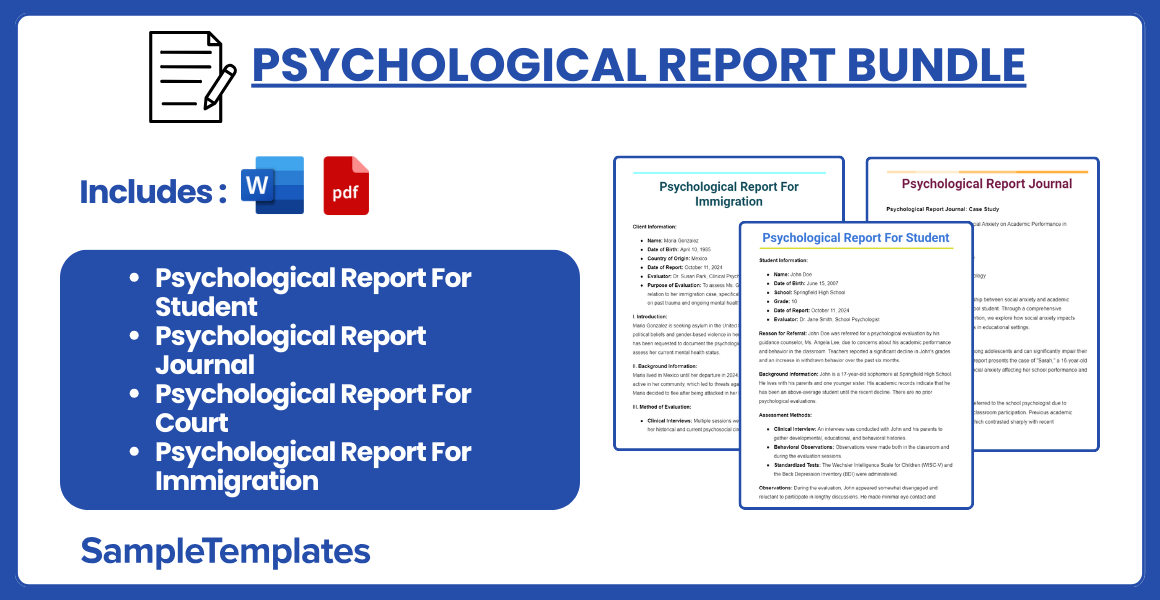
Download Psychological Report Bundle
Psychological Report For Student
Student Information:
- Name: John Doe
- Date of Birth: June 15, 2007
- School: Springfield High School
- Grade: 10
- Date of Report: October 11, 2024
- Evaluator: Dr. Jane Smith, School Psychologist
Reason for Referral: John Doe was referred for a psychological evaluation by his guidance counselor, Ms. Angela Lee, due to concerns about his academic performance and behavior in the classroom. Teachers reported a significant decline in John’s grades and an increase in withdrawn behavior over the past six months.
Background Information: John is a 17-year-old sophomore at Springfield High School. He lives with his parents and one younger sister. His academic records indicate that he has been an above-average student until the recent decline. There are no prior psychological evaluations.
Assessment Methods:
- Clinical Interview: An interview was conducted with John and his parents to gather developmental, educational, and behavioral histories.
- Behavioral Observations: Observations were made both in the classroom and during the evaluation sessions.
- Standardized Tests: The Wechsler Intelligence Scale for Children (WISC-V) and the Beck Depression Inventory (BDI) were administered.
Observations: During the evaluation, John appeared somewhat disengaged and reluctant to participate in lengthy discussions. He made minimal eye contact and responded to questions with brief answers. In the classroom, teachers noted that he often sits alone and does not participate in group activities.
Test Results:
- Cognitive Functioning:
- The WISC-V revealed that John has an overall IQ in the average range. His verbal comprehension and perceptual reasoning scores were in line with age expectations, but his working memory and processing speed indices were notably lower than his general cognitive capabilities.
- Emotional Assessment:
- The BDI scores suggest mild to moderate depression. John reported feelings of sadness, loss of interest in activities he previously enjoyed, and low energy levels.
Diagnoses:
- Primary Diagnosis: Major Depressive Disorder, Mild
- Rule Out: Anxiety Disorder NOS
Recommendations:
- Psychotherapy: It is recommended that John engage in individual psychotherapy to address depressive symptoms and improve emotional regulation.
- Academic Support: Consultation with the school’s special education team to provide academic accommodations, such as extended time for assignments and tests, to help reduce stress and improve academic performance.
- Family Counseling: Family therapy could be beneficial to improve family dynamics and support John’s mental health.
- Follow-up Evaluation: A re-evaluation in six months to monitor John’s progress and update treatment plans as necessary.
Conclusion: The results of the psychological evaluation indicate that John is experiencing a significant depressive episode, which appears to be impacting his academic performance and social interactions. With the recommended interventions, there is a hopeful prognosis for improvement in John’s psychological well-being and school functioning.
Evaluator: Dr. Jane Smith
Licensed School Psychologist
Springfield High School
Contact: [email protected]
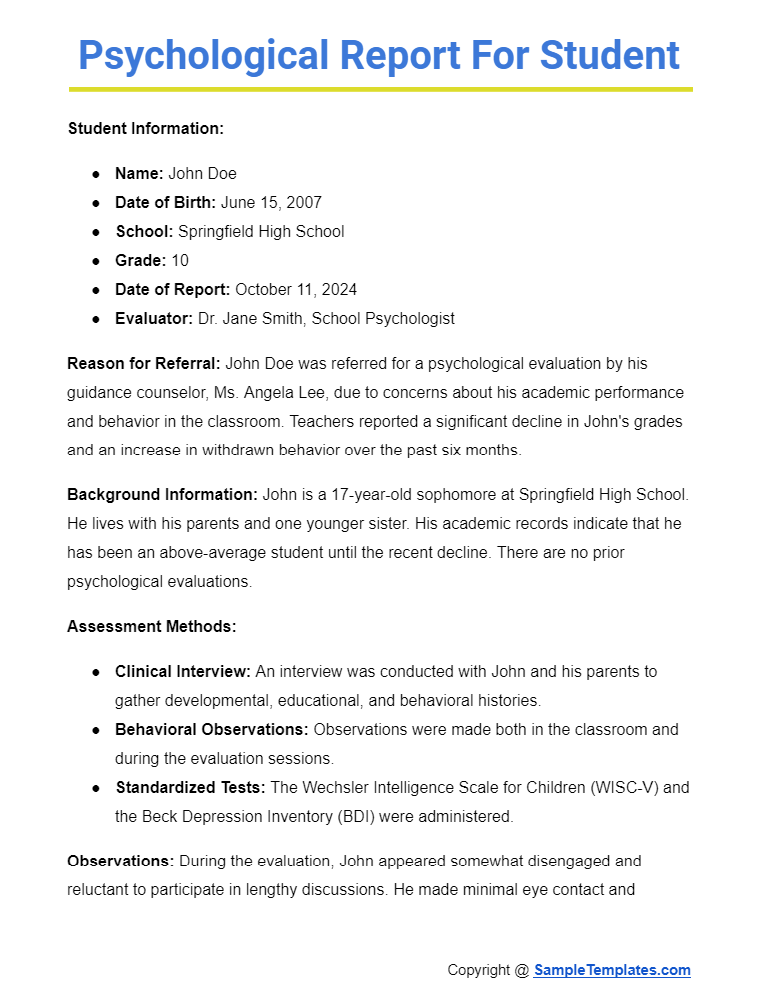
Psychological Report Journal
Psychological Report Journal: Case Study
Title: Understanding the Impact of Social Anxiety on Academic Performance in Adolescents
Author: Dr. Emily Thompson
Institution: University Health Services
Date: October 11, 2024
Journal: Journal of Adolescent Psychology
Abstract:
This case study examines the relationship between social anxiety and academic performance in a 16-year-old high school student. Through a comprehensive psychological assessment and intervention, we explore how social anxiety impacts learning abilities and social interactions in educational settings.
Introduction:
Social anxiety disorder is prevalent among adolescents and can significantly impair their academic and social functioning. This report presents the case of “Sarah,” a 16-year-old student who displayed symptoms of social anxiety affecting her school performance and peer relationships.
Case Presentation:
Sarah is a junior at City High School, referred to the school psychologist due to declining grades and withdrawal from classroom participation. Previous academic records indicated high achievement, which contrasted sharply with recent performances.
Methodology:
- Assessment Techniques: Clinical interviews with Sarah and her parents, behavioral observations in school settings, and standardized psychological testing.
- Instruments Used: The Social Anxiety Scale for Adolescents (SAS-A) and the Wechsler Intelligence Scale for Children (WISC-V).
Findings:
Sarah’s scores on the SAS-A indicated severe social anxiety. The WISC-V results showed above-average cognitive abilities, suggesting that her academic decline was not related to cognitive capacity but likely due to emotional and psychological factors.
Discussion:
The findings illuminate the profound effect social anxiety can have on an adolescent’s ability to perform academically. Sarah’s case supports existing research that suggests social anxiety can lead to significant academic decline and social withdrawal.
Interventions:
- Cognitive Behavioral Therapy (CBT) focused on anxiety management.
- Peer Interaction Strategies: Encouraging structured group work and school social functions.
- Family Therapy: To address communication issues and support strategies at home.
Outcomes:
After six months of intervention, Sarah showed marked improvement in both academic performance and social interactions. Her anxiety symptoms decreased, and she became more active in class discussions and group activities.
Conclusion:
This case study highlights the critical need for early identification and treatment of social anxiety in adolescents. Integrating psychological support within educational settings can mitigate the negative impacts of social anxiety on academic performance.
References:
- [Author et al., 2023]. The Impact of Social Anxiety on Learning Outcomes in Teenagers.
- [Author et al., 2022]. Cognitive Behavioral Therapy and Its Efficacy in Treating Adolescent Anxiety.
Correspondence:
Dr. Emily Thompson
University Health Services
[email protected]
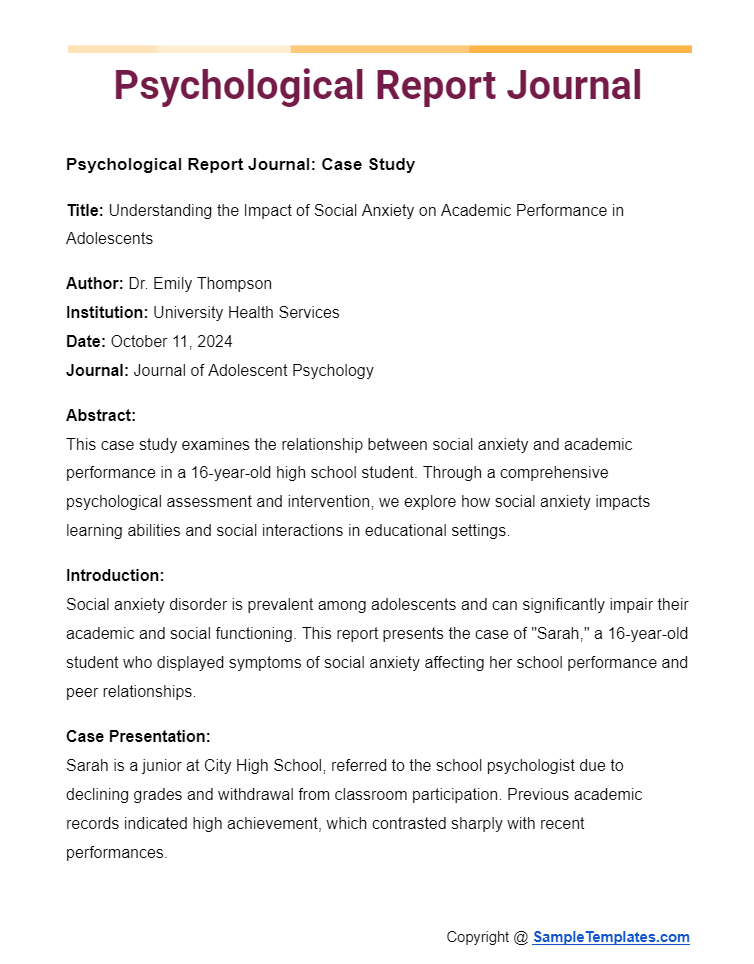
Psychological Report For Court
Case Name: State vs. John Doe
Case Number: 2024-CR-123456
Date: October 11, 2024
Evaluator: Dr. Lisa Cartwright, Clinical Psychologist
Referral Source: Judge Amanda Clark
Purpose of Evaluation: To assess Mr. Doe’s mental health status and its impact on his competency to stand trial.
I. Background Information:
Defendant Information:
- Name: John Doe
- Date of Birth: January 1, 1990
- Education: High School Diploma
- Employment: Unemployed at the time of arrest
Legal Charges:
- Mr. Doe is charged with two counts of burglary and one count of aggravated assault. He was arrested on August 15, 2024, and has been in custody since that date.
II. Method of Evaluation:
- Clinical Interviews: Interviews were conducted with Mr. Doe, his family members, and law enforcement personnel involved in the case.
- Psychological Testing: The Minnesota Multiphasic Personality Inventory (MMPI-2) and the MacArthur Competence Assessment Tool-Criminal Adjudication (MacCAT-CA) were administered.
- Review of Records: Medical, psychiatric, and criminal justice records were reviewed.
III. Behavioral Observations:
Mr. Doe was cooperative during the evaluation sessions but appeared visibly anxious and had difficulty maintaining concentration. He was oriented to person, place, time, and situation.
IV. Psychological Findings:
- Cognitive Functioning: Mr. Doe’s cognitive testing placed him in the low average range of intelligence. There were no indications of intellectual disability.
- Personality Assessment: The MMPI-2 indicated high scores on scales associated with paranoia and schizophrenia. Symptoms observed included delusions and auditory hallucinations.
- Competency Evaluation: Results from the MacCAT-CA suggest that Mr. Doe has limited understanding of the court proceedings and difficulty in assisting in his defense due to his mental health issues.
V. Diagnosis:
- DSM-5 Diagnosis: Schizophrenia, Paranoid Type
VI. Conclusion and Recommendations:
- Competency to Stand Trial: It is my professional opinion that Mr. Doe is currently not competent to stand trial due to severe mental illness that impairs his ability to understand the nature of the court proceedings and to assist properly in his defense.
- Treatment Recommendations: Immediate psychiatric treatment, including medication and psychotherapy, is recommended. A re-evaluation of competency should be considered after a period of stabilization.
- Legal Recommendations: Consideration for a mental health diversion program or court-ordered psychiatric hospitalization may be appropriate given Mr. Doe’s current mental state and the nature of the criminal charges.
VII. Statement of Understanding:
This report is prepared at the request of the court and is intended for use in legal proceedings related to Mr. John Doe’s competency to stand trial. The information contained herein is confidential and is based upon the current evaluation.
Evaluator: Dr. Lisa Cartwright, Ph.D., Licensed Clinical Psychologist
License No: [State/123456]
Address: [Address]
Phone: [Phone Number]
Email: [Email Address]
Signature: [Dr. Lisa Cartwright]
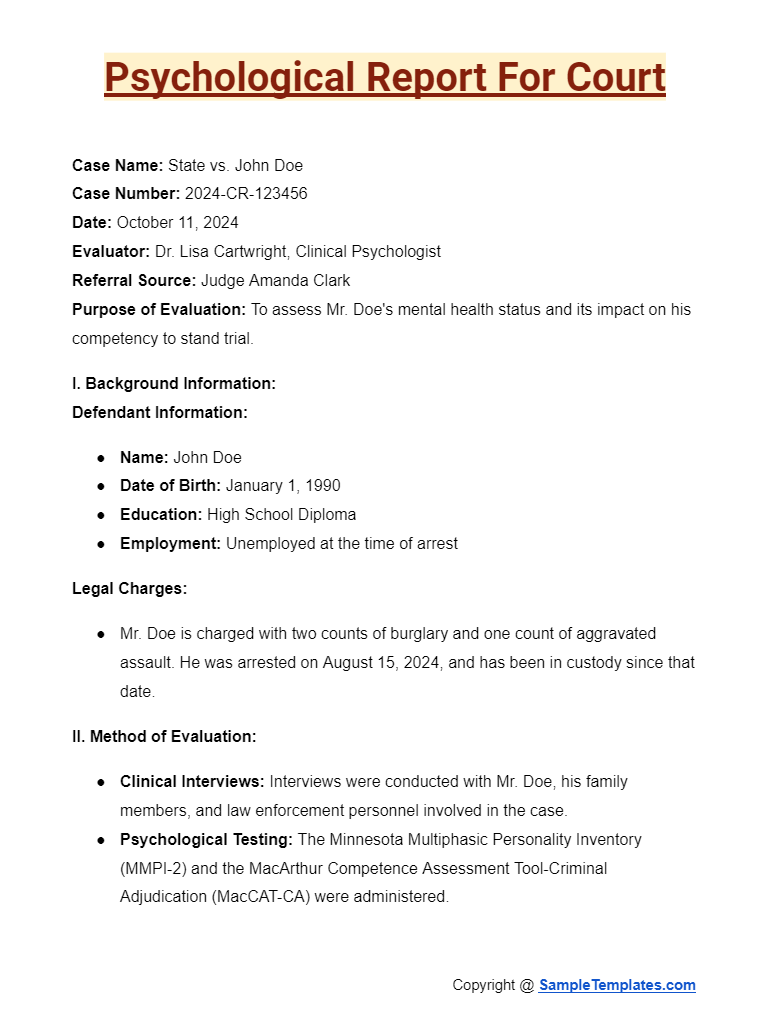
Psychological Report For Immigration
Client Information:
- Name: Maria Gonzalez
- Date of Birth: April 10, 1985
- Country of Origin: Mexico
- Date of Report: October 11, 2024
- Evaluator: Dr. Susan Park, Clinical Psychologist
- Purpose of Evaluation: To assess Ms. Gonzalez’s psychological condition in relation to her immigration case, specifically in regard to her asylum claim based on past trauma and ongoing mental health issues.
I. Introduction:
Maria Gonzalez is seeking asylum in the United States citing persecution based on political beliefs and gender-based violence in her home country of Mexico. This report has been requested to document the psychological impact of her experiences and to assess her current mental health status.
II. Background Information:
Maria lived in Mexico until her departure in 2024. She reports having been politically active in her community, which led to threats against her life and physical assaults. Maria decided to flee after being attacked in her home in early 2024.
III. Method of Evaluation:
- Clinical Interviews: Multiple sessions were held with Ms. Gonzalez to discuss her historical and current psychosocial circumstances.
- Psychological Testing: The Harvard Trauma Questionnaire (HTQ) and the Hopkins Symptom Checklist (HSCL-25) were administered to assess symptoms of PTSD and anxiety/depression.
- Review of Documents: Medical records, witness statements, and supporting documents from human rights organizations were reviewed.
IV. Behavioral Observations:
Ms. Gonzalez was cooperative but appeared highly distressed throughout the evaluation sessions. She was often tearful and exhibited signs of anxiety such as tremors and difficulty maintaining eye contact.
V. Findings:
- Trauma Exposure: According to the HTQ, Ms. Gonzalez meets the criteria for Post-Traumatic Stress Disorder (PTSD) due to her experiences of violence and persecution.
- Mental Health Status: The HSCL-25 indicated severe levels of depression and anxiety. These symptoms are consistent with her reported experiences and have significantly impaired her daily functioning.
VI. Diagnosis:
- DSM-5 Diagnoses:
- Post-Traumatic Stress Disorder (PTSD)
- Major Depressive Disorder, Severe
- Generalized Anxiety Disorder
VII. Conclusion and Recommendations:
Ms. Gonzalez’s psychological assessment indicates that she has experienced significant trauma which has resulted in chronic psychological conditions necessitating clinical intervention. Returning to Mexico could exacerbate her mental health conditions due to the lack of adequate psychological support and the potential for re-traumatization.
- Treatment Recommendations: Continued psychological treatment, including trauma-focused psychotherapy and pharmacotherapy, is crucial for her recovery.
- Immigration Considerations: It is recommended that her current mental health status and history of persecution be considered in her asylum application. The psychological impact of her experiences supports her claim of persecution and the ongoing risk if she were to return to Mexico.
VIII. Statement of Understanding:
This report is intended for use in legal proceedings related to Ms. Maria Gonzalez’s immigration and asylum case. The findings are based on a thorough psychological evaluation and are provided with professional responsibility.
Evaluator: Dr. Susan Park, PsyD
Licensed Clinical Psychologist
License No: [State/456789]
Address: [Address]
Phone: [Phone Number]
Email: [Email Address]
Signature:
[Dr. Susan Park]
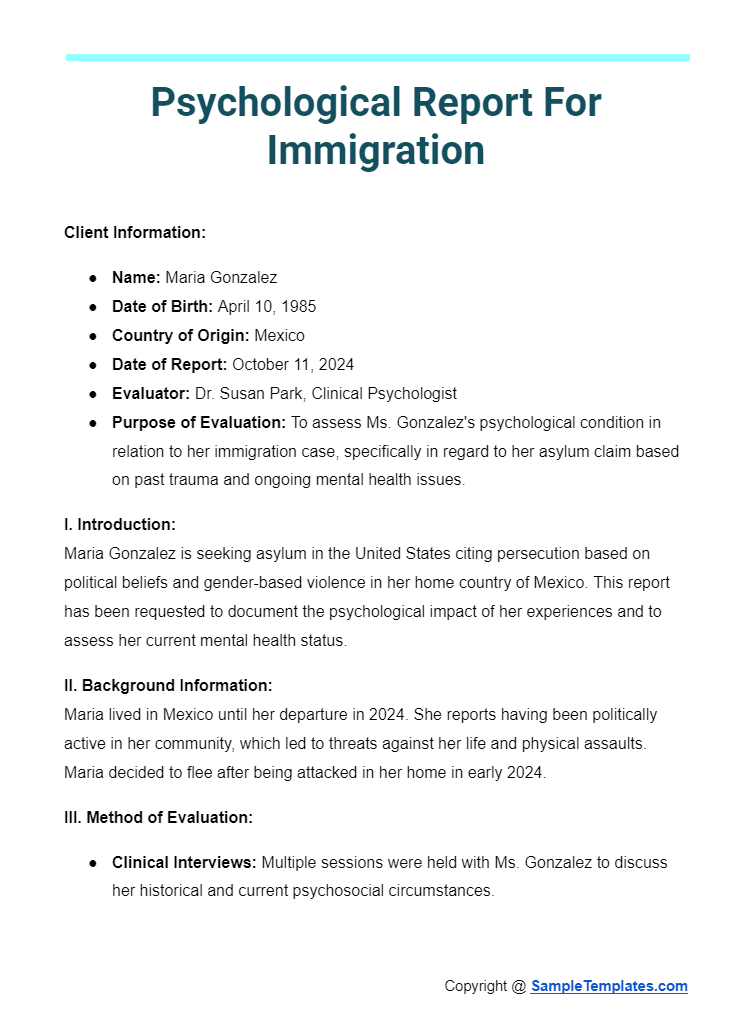
Browse More Templates On Psychological Report
Psychological Report Template
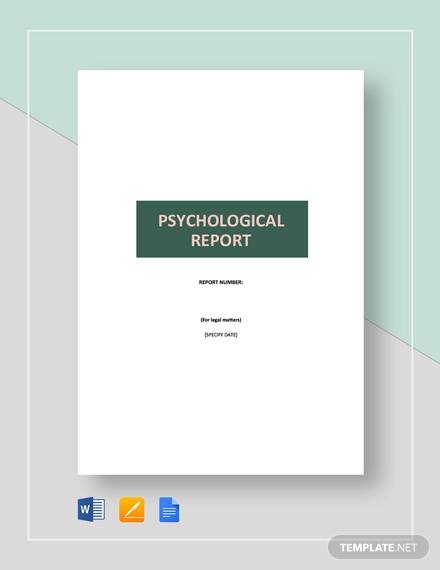
Psychological Report Template
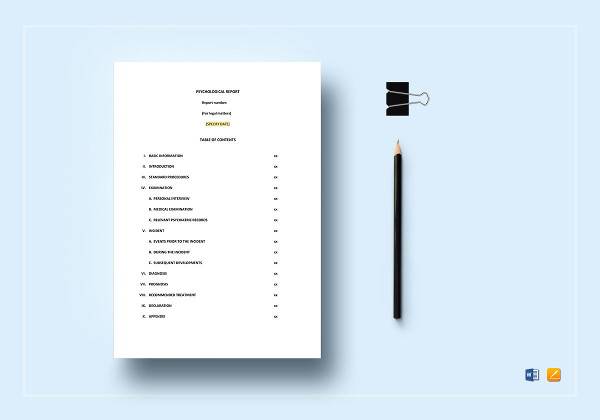
How Do You Write a Psychology Report?
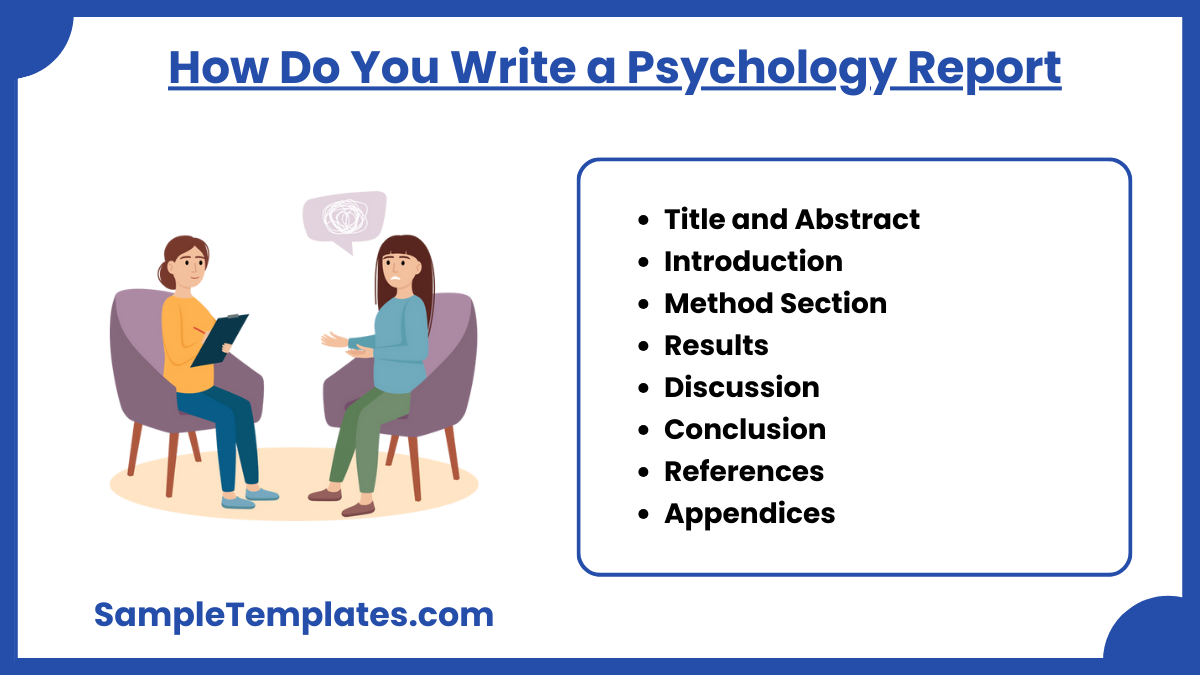
- Title and Abstract: Start with a concise title that clearly describes the report’s content. Follow this with an abstract—a brief summary of the report’s key points including the research question, methods, results, and conclusions. You can also see more on Psychological Assessment Report.
- Introduction: The introduction should outline the theoretical framework, define key terms, state the research question, and present the hypothesis. It provides a background that justifies the research and ties it to larger issues or previous studies.
- Method Section: Describe the research design, participants, procedures, and instruments used. This section should be detailed enough to allow another researcher to replicate the study.
- Results: Present the findings without interpretation. Use tables, graphs, and statistical data to convey the results effectively. Be clear about what the data reveals in terms of your hypotheses. You can also see more on Psychological Evaluation.
- Discussion: Interpret the results, discuss how they fit with or challenge existing knowledge, and address any limitations of the study. This section should also explore the implications of the findings and suggest areas for future research.
- Conclusion: Summarize the main findings and their implications in a clear and concise manner. Restate the research question and consider the broader impacts of the results.
- References: List all the sources cited in the report in accordance with the specific format (APA, MLA, etc.) used by your academic or professional field. This section demonstrates the research foundation and gives credit to original sources. You can also see more on Writing Assessment Report.
- Appendices: Include any supplementary material that is relevant but not integral to the main text, such as raw data, detailed methodological descriptions, or additional analyses.
Psychological Assessment Report Sample
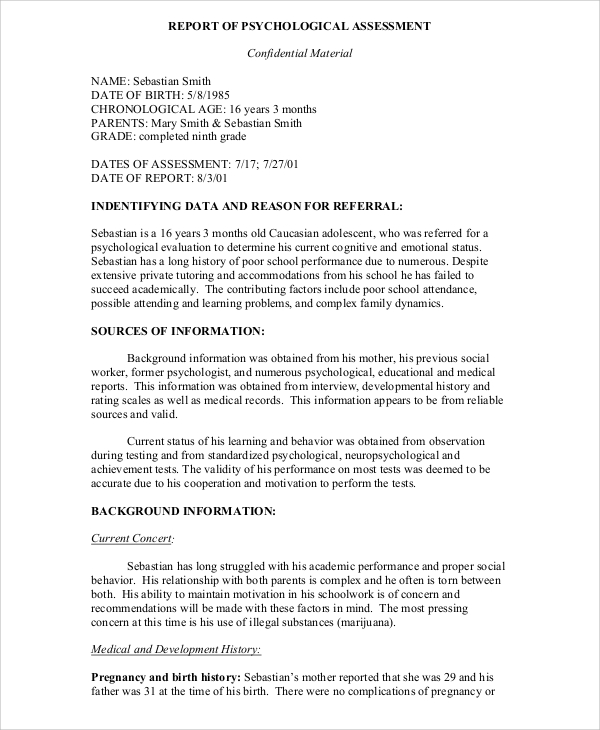
Details
File Format
Size: 150 KB
DownloadThis is a template prepared to help psychologists on how to make a comprehensive report about their assessment. This template can be downloaded and customized or be used as a guide to help them ensure that no piece of information is left out. The template can be downloaded from our website for free. You may also see research project reports.
Psychological Medico Legal Report Sample
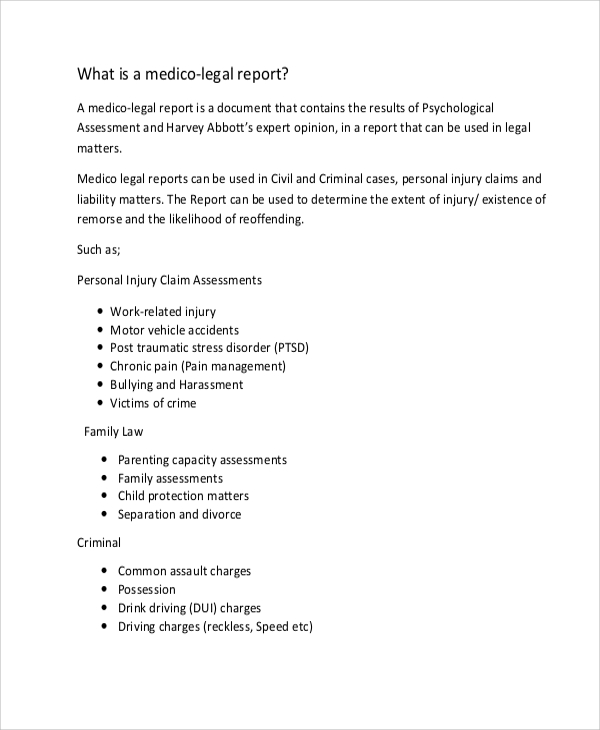
Details
File Format
Size: 77 KB
DownloadThis is a medical report template that is prepared to be used in the court or other legal matters. It has a particular format and unique writing style. For psychologists looking forward to writing one, they can download the template from our website for free and customize them.
Psychological Diagnostic Report
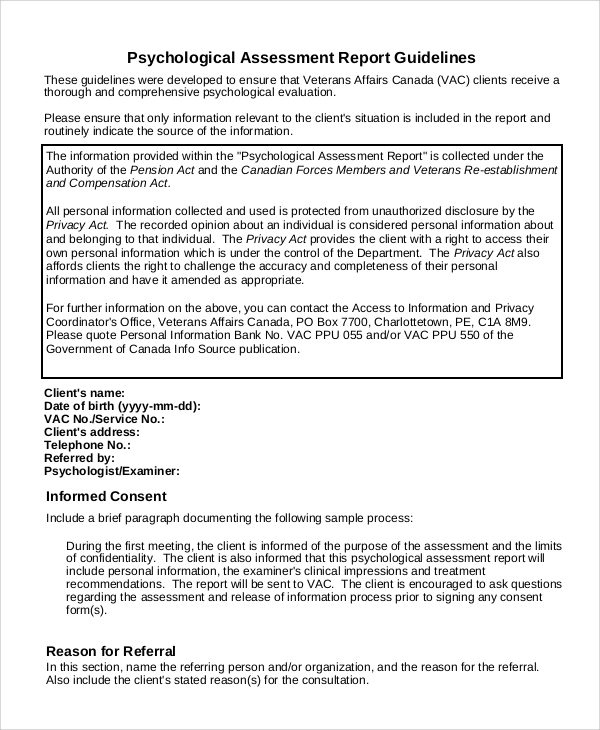
Details
File Format
Size: 45 KB
DownloadThis is a report prepared after a person has undergone psychological diagnosis. The report can be used in legal matters or for medication. Our sites have a template that can be used to aid the process of writing the report. The template is fully customizable, and it’s available in MS Word document format.
Importance of Psychological Report
- Diagnostic Clarification: Psychological reports help in diagnosing mental health disorders by providing a detailed assessment of an individual’s psychological state. This includes observations, test results, and clinical evaluations, aiding in accurately identifying conditions such as depression, anxiety, and personality disorders.
- Treatment Planning: They are essential for formulating effective treatment plans. By understanding the specific psychological and emotional issues an individual faces, therapists can tailor interventions that are more likely to be effective, considering the individual’s unique needs. You can also see more on Student Counseling Report.
- Progress Monitoring: These reports allow for the tracking of changes over time, offering a documented baseline against which to measure the effectiveness of therapeutic interventions. This helps in adjusting treatment plans as necessary to ensure the best outcomes.
- Educational and Occupational Applications: In educational settings, psychological reports can guide decisions regarding special services, accommodations, or interventions that support learning. In occupational contexts, they help in understanding employee behaviors, facilitating better management strategies, or supporting career development.
- Legal and Forensic Use: In legal settings, psychological reports can provide critical information for custody disputes, competency evaluations, and disability claims. They offer insights into an individual’s psychological profile that can impact legal decisions. You can also see more on Assessment Report.
- Research Purposes: For researchers, these reports contribute to scientific studies by providing data on psychological phenomena. This can enhance understanding of behavioral patterns, mental health conditions, and the effectiveness of different treatment modalities.
- Personal Insight: Individuals can gain personal insights from psychological evaluations, helping them understand their own behaviors, triggers, and psychological patterns. This awareness can be pivotal in personal growth and self-improvement.
- Communication Among Professionals: Psychological reports facilitate communication among healthcare providers by standardizing the documentation of an individual’s psychological status. This ensures that all practitioners involved in a person’s care are well-informed and can collaborate effectively. You can also see more on Mental Status Examination Report.
School Psychological Report Sample
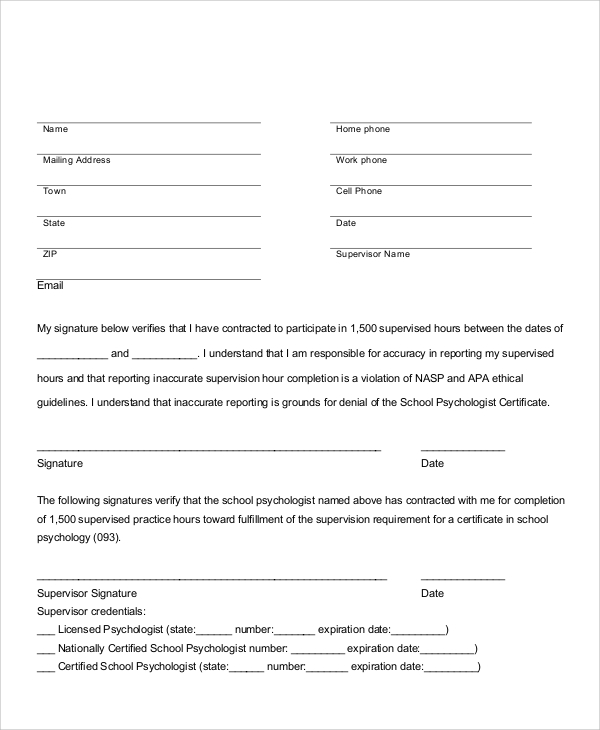
Details
File Format
Size: 166 KB
DownloadThis is template prepared for students who are undergoing psychological diagnosis or assessment. It is a template that can be customized and people can use it as a guide for writing their report. This template is free for download. You may also see daily reports.
Sample Psychological Report
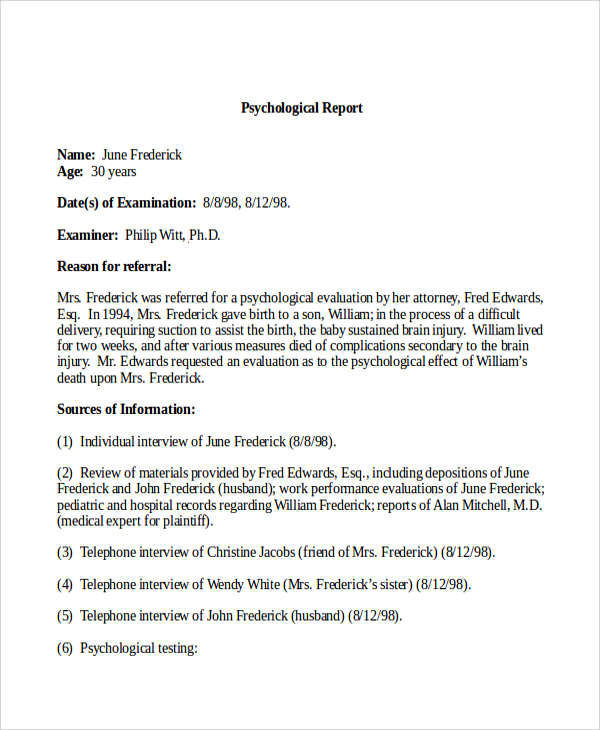
Details
File Format
- DOC
Size: 10 KB
DownloadWhat is Included in a Psychology Report?
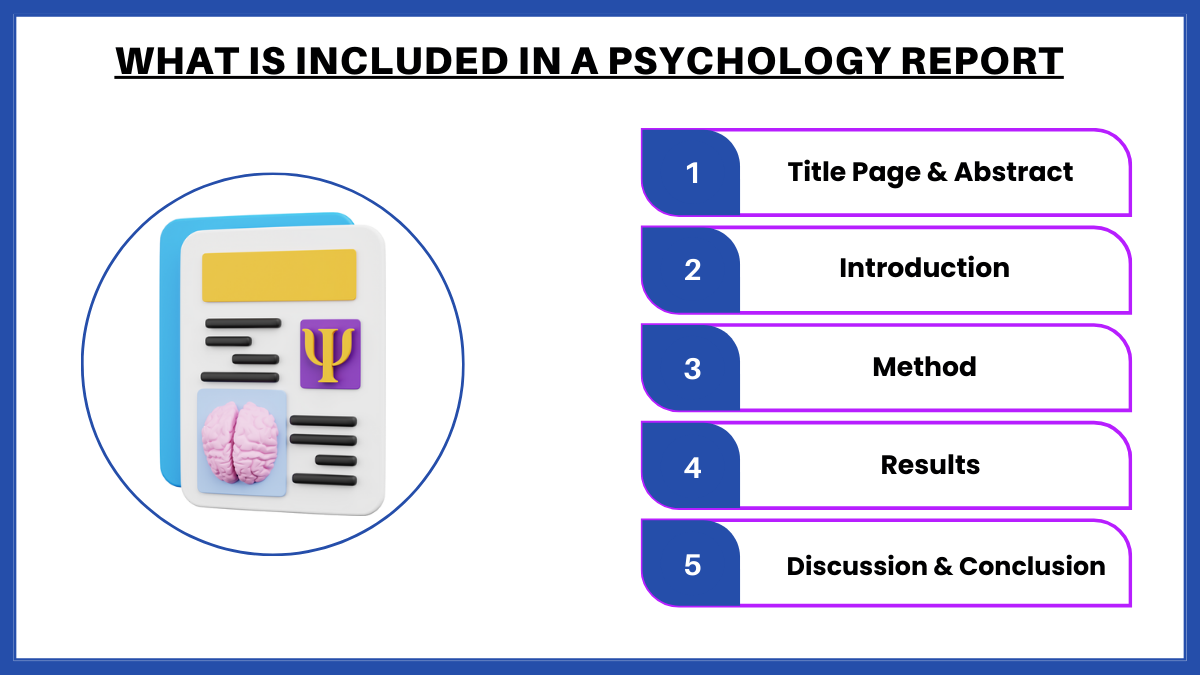
- Title Page and Abstract:
- Title Page: This includes the title of the report, author’s name, and the date. The title should be concise yet descriptive enough to convey the main topic or aim of the report.
- Abstract: A brief summary of the report, usually about 150-250 words, summarizing the purpose, methods, results, and conclusions of the study. You can also see more on Neuropsychological Evaluation Report.
- Introduction:
- This section provides the background information necessary to understand the research. It outlines the theoretical framework, reviews relevant literature, states the research questions or hypotheses, and sets the context for the study.
- Method:
- Participants: Details about the participants, including how many, their demographic characteristics, and how they were selected.
- Procedure: Description of how the research was conducted, including the steps followed during the study. You can also see more on Psychology Research Proposal.
- Materials/Measures: Information on the materials used, such as tests, surveys, or equipment, and a description of how these were used to collect data.
- Results:
- This section presents the findings of the study without interpretation. It includes statistical data, responses to research questions, and can be accompanied by tables, graphs, and figures to illustrate the data clearly.
- Discussion and Conclusion:
- Discussion: This part interprets the results, discusses their implications, and how they fit into the broader field of study. It also addresses the limitations of the study and suggests areas for future research.
- Conclusion: Summarizes the main findings and their practical implications, reiterating how the results relate to the original hypotheses or research questions. You can also see more on Bio-Psychosocial Assessment Report.
Confidential Psychological Evaluation Report
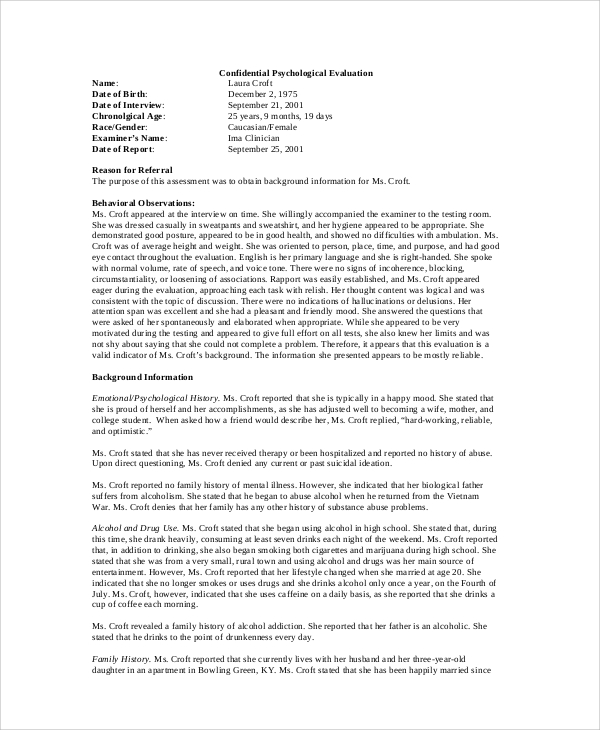
Details
File Format
Size: 18 KB
DownloadSample Pre Employment Psychological Report
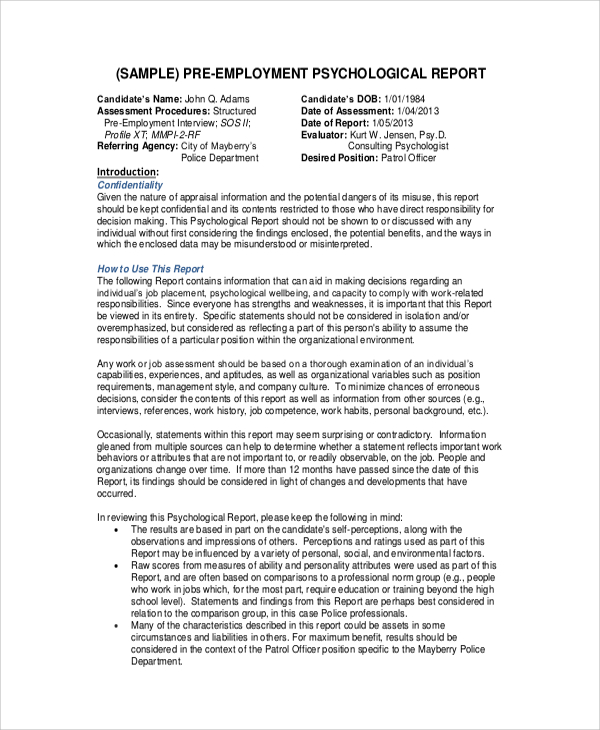
Details
File Format
Size: 555 KB
DownloadWhat are the Three Levels of Psychological Report?
- Screening Reports (Level 1):
- Purpose: Used for initial assessments to determine if further evaluation is necessary.
- Content: Includes basic information and brief testing results to identify potential psychological issues.
- Audience: General practitioners, teachers, or other non-specialists who need preliminary data. You can also see more on Psychology Case Study.
- Standard Reports (Level 2):
- Purpose: Provides a more detailed evaluation and is used for diagnosing and planning treatment.
- Content: Contains comprehensive test results, a full clinical history, diagnosis, and treatment recommendations.
- Audience: Mental health professionals, educators for developing educational plans, or employers for occupational health assessments.
- Comprehensive Reports (Level 3):
- Purpose: Used in complex cases that require in-depth analysis and extensive detail.
- Content: Includes detailed test interpretations, longitudinal assessments, multiple data sources, and an in-depth analysis of the individual’s psychological condition.
- Audience: Specialists such as psychiatrists, psychologists, or courts where detailed explanations and extensive documentation are necessary.
These levels ensure that reports are tailored to the specific needs of the requesting parties, providing the appropriate depth of information for decision-making in clinical, educational, or legal contexts.
Confidentiality Psychological Report Sample

Details
File Format
Size: 43 KB
DownloadWhy is a Psychology Report Needed?
A psychology report is needed in most places, some of these places also include school. Teachers at sometimes need to know whether their students are normal, or they have a psychological problem after seeing their behavior, having a psychology assessment carried out and brought the results to them helps them to determine whether certain students need special care or not. A psychology report is also used for legal matters and to know if someone can handle some cases in the court of law or not. You may also see competitor analysis reports
When is a Psychology Report Needed?
A psychology report is needed whenever one has a psychological problem, and they want it solved. Visiting a psychologist and having the assessment done, will make you eligible for the report. The report is also needed by another psychologist to know your psychological state and determine which treatment you require so as they can settle the problem. It is also -needed in the court of law to determine whether the charge is sane or insane. This helps the judge to make the charges. You may also see performance reports.
A psychological report is a very important document. It is used to show the current or the previous psychological state of a person. It has some benefits and among them, it helps in treatments and also in making judgment in the court of law. You may also see news paper reports.
What makes a good psychology report?
A good psychology report is clear, concise, well-structured, and objective. It includes accurate data, thoughtful analysis, and follows ethical guidelines for reporting and confidentiality.
How to start a psychological report?
Start a psychological report by clearly defining the purpose, introducing the background and rationale, stating the research question or objectives, and outlining the structure of the report.
How to improve psychology writing?
Improve psychology writing by reading widely in the field, practicing clear and concise expression, using active voice, adhering to APA style guidelines, and seeking feedback from peers.
What are research reports in psychology?
Research reports in psychology detail original studies, presenting methodology, data analysis, results, and conclusions. They contribute to scientific knowledge and are often peer-reviewed before publication.
If you have any DMCA issues on this post, please contact us!
Related Posts
School Accomplishment Report Samples & Templates
Field Report Samples & Templates
Sample Science Project Reports
Business Report Samples & Templates
Survey Reports Samples & Templates
Sample Feasibility Reports
Psychological Assessment Report Samples [ Clinical, Child, Intake ]
Report Format Samples & Templates
Acknowledgement for Internship Report Samples [ Hotel, Hospital, Teaching ]
Field Trip Report Samples [ Agriculture, Educational, Environmental ]
Student Counseling Report Samples
Narrative Accomplishment Report Samples [ Science, Teacher, Reading ]
Sample Acknowledgment Report Templates
Internship Narrative Report Samples
Interview Summary Report Samples
